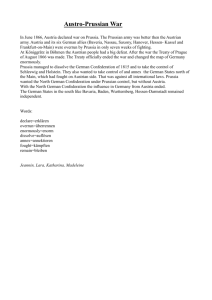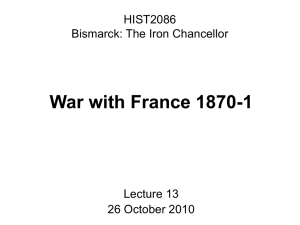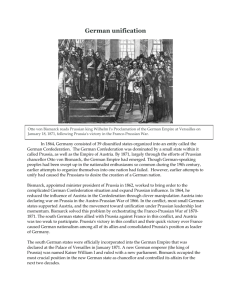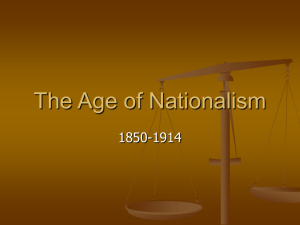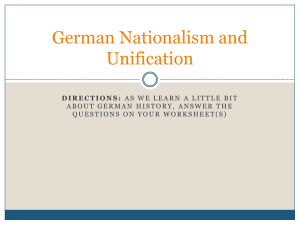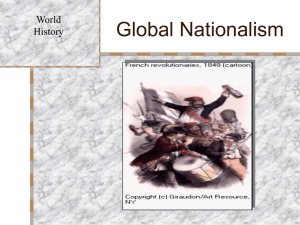HIST2128 Germany, 1871-1933: From Empire to Republic
advertisement
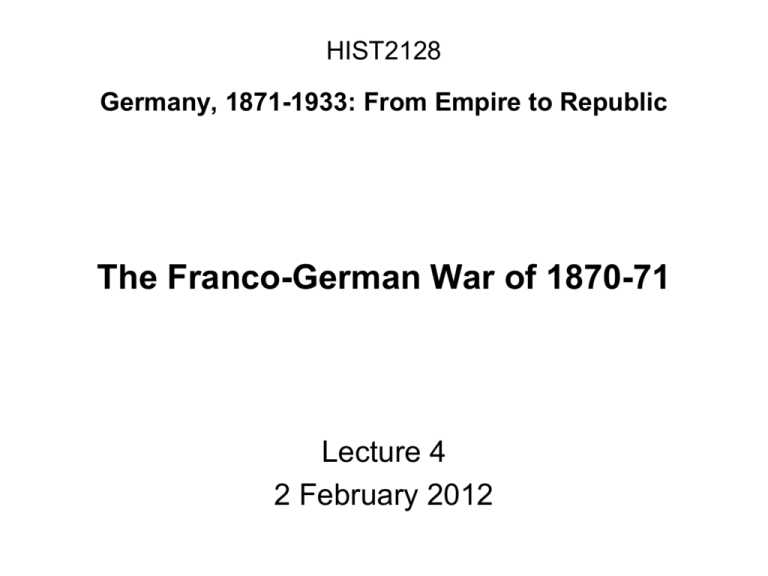
HIST2128 Germany, 1871-1933: From Empire to Republic The Franco-German War of 1870-71 Lecture 4 2 February 2012 War with Austria = German Civil War’ – ‘German War’ – ‘Seven Weeks’ War’ – Brothers’ War (Deutscher Krieg) Reason: Continued struggle between Prussia and Austria for dominance in German Confederation • Austria: 400,000 troops + support of most of ‘Third Germany’ ≠ Prussia 300,000 troops • Italy’s entry into war: Two-front-war for Austria but Italy quickly defeated Treaty of Prague (1) (Prussia-Austria, Aug 1866) • Prussia’s annexation of S-H, Hesse-Cassel, Hanover, Nassau, Frankfurt • North German states to join North German Confederation under Prussian leadership • Independence of South German states guaranteed due to French intervention + Bismarck’s fear of too quick absorption but signing of secret military alliance between South Germany + Prussia in case of French attack Treaty of Prague (2) (Prussia-Austria, Aug 1866) • Usually seen as milestone on way to German unity • Destroyed unity of German Confederation + secured Prussia’s dominance in Germany • Separated Germans into 3 units: North German Confederation, 4 South German states, Austria = Prussia enlarged by 1/5 with coherent territory = German nation state now only blocked by France Napoleon's strategy 1867-70 • Re-strengthen ‘Bonapartism’ by successful foreign politics • To set-up a coalition of France + Austria + Italy ≠ Prussia (+ Russia) But: Austria’s readiness for war only when Russia sided Prussia Italy’s excessive territorial demands incl. Papal State at Rome under French military protection = No formal coalition: Unsuccessful French plans Hohenzollern Candidature Crisis (1) Spanish revolution of 1868: • Driving out Spanish Queen Isabella • Moderate Spanish right’s search for new monarch to safeguard monarchy → Offer of Spanish crown to Prince Leopold of Hohenzollern = Catholic side-branch of royal Prussian House of Hohenzollern Hohenzollern Candidature Crisis (2) • Bismarck’s secret encouragement of Hohenzollern candidature • Strong French critic after official publication of candidature + desire for triumph, for intimidation, humiliation of Prussia + creating war-like mood • Spanish renunciation of Leopold’s candidature after strong French pressure: Such voluntary step of Leopold not enough to satisfy French negative ambitions towards Prussia Hohenzollern Candidature Crisis (3) • France’s demand of official renunciation from King William I on behalf of Leopold for all time = Overemphasising crisis + Napoleon’s overplaying his hand • France’s demand refused by King William but his conciliatory reply to French ambassador Benedetti at Bad Ems • ‘Ems telegram’ amended by Bismarck to provoke war with France → King’s action seemingly more abrupt + dismissive than in reality Hohenzollern Candidature Crisis (3) Napoleon’s situation: • Option 1: To suffer major diplomatic defeat against Prussia → probably end of Napoleon’s government • Option 2: To escape into war → probably good chance to defeat Prussia: Declaration of war, 19 Jul 1870 Warfare (1) • Strong anti-French feelings in all-Germany: ‘National uprising’ in North and South • Neutral stance of Russia + Austria + Britain • Quick mobilisation of Prussian + other German states armies + well-trained troops under Prussian General von Moltke • France’s war declaration with no prior preparation or military action → Slow mobilisation of French army → early battles defeats Warfare (2) 3 major series of operations: • Battles leading to trapping of French army under Bazaine in Metz (- October 1870) • Surrender of Napoleon III at Sedan (2 Sep 1870) • Investment of Paris (- 28 Jan 1871) War Results Founding of German Empire at Versailles, 18 Jan 1871 Treaty of Frankfurt, May 1871: • Annexation of French provinces Alsace + (East-) Lorraine by Germany • Heavy French war indemnity = New border line for military strategic reasons = Strong German public pressure on Bismarck to annex French territory as punishment ► Long-lasting French revenge feeling

